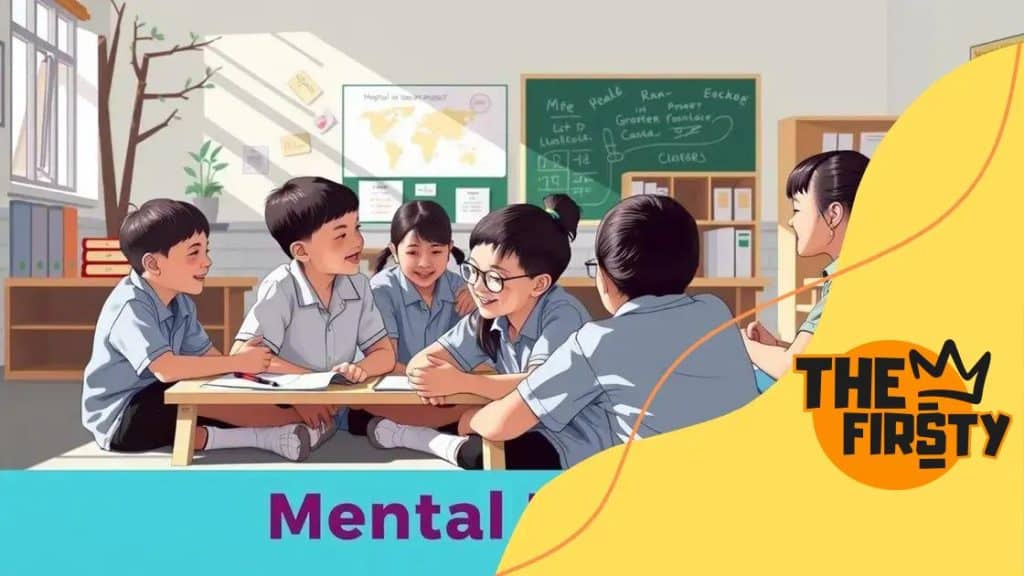The importance of mental health resources in schools

Anúncios
The importance of mental health resources in schools lies in their ability to provide essential support for students, enhancing academic performance, promoting well-being, and fostering a culture of understanding within the educational community.
The importance of mental health resources in schools is becoming increasingly clear. These resources not only support students’ well-being but also enhance their overall academic performance. Have you ever wondered how schools can become safer and more nurturing environments?
Anúncios
Understanding the role of mental health resources
Understanding the role of mental health resources is crucial in today’s schools. These resources provide essential support for students facing various challenges, allowing them to thrive academically and emotionally.
What Are Mental Health Resources?
Mental health resources include various services and support systems designed to address the needs of students. These can range from school counselors and psychologists to peer support groups and educational workshops.
Many schools are now recognizing the necessity of integrating mental health awareness into their curriculum. This integration not only helps to destigmatize mental health issues but also promotes a culture of understanding and support among students.
Anúncios
Benefits of Mental Health Resources
Implementing these resources can lead to positive outcomes in the school environment. Here are some key benefits:
- Improved Academic Performance: Students who receive mental health support often show enhanced focus and better grades.
- Stronger Relationships: Mental health resources help students build healthier relationships with their peers and teachers.
- Increased Resilience: Students become more equipped to handle stress and adversity through coping strategies learned from these resources.
Furthermore, when students feel supported, their engagement in school activities increases. This engagement is vital for a positive school climate, which ultimately benefits everyone involved.
Schools that prioritize mental health embark on a journey to create a safe and nurturing environment. By doing so, they not only support the well-being of students but also foster a community that values mental health.
In conclusion, understanding the role of mental health resources is essential for establishing supportive educational settings. Schools must continue to innovate and evolve these resources to meet the growing needs of their students effectively.
Benefits of mental health support in education
The benefits of mental health support in education extend beyond just individual students. These supports create a more positive school atmosphere where everyone can thrive.
Enhancing Student Performance
When students have access to mental health resources, their academic performance often improves. Many students who struggle with anxiety or depression may find it hard to concentrate in class. With proper support, students learn techniques to manage their emotions, which leads to better focus and higher grades.
- Academic Success: Supported students typically have higher GPAs.
- Attendance Improvement: Students are more likely to attend school regularly when they feel supported.
- Decreased Dropout Rates: Access to mental health resources can help reduce disruptions that lead to dropping out.
Moreover, a strong mental health support system fosters resilience. Students develop coping strategies that not only help them in school but also in life. Encouraging this resilience is crucial as it prepares them for future challenges.
Building Stronger Communities
When mental health support is prioritized in education, it can lead to stronger community bonds. Schools become hubs where students and families feel understood. This fosters a culture of compassion and shared responsibility.
For instance, schools that involve parents in mental health initiatives often see positive outcomes. When families are educated about mental health, they can better support their children. This creates a collaborative environment between schools and homes.
Additionally, supporting mental health leads to healthier relationships among students. By promoting empathy and understanding, students learn to support one another, reducing bullying and fostering friendships.
In summary, the benefits of mental health support in education are far-reaching. They enhance not just individual performance but contribute to the overall wellbeing of the school community.
Strategies for implementing mental health programs

Implementing mental health programs in schools is essential for creating a supportive environment. There are several effective strategies that educators can adopt to make these programs successful.
Establishing a Clear Framework
One of the first steps is to establish a clear framework for the program. This includes defining goals, identifying necessary resources, and determining how to measure success. A well-defined structure helps everyone understand their role in promoting mental health.
- Set Clear Goals: Determine what you aim to achieve, such as improving student wellbeing or reducing absenteeism.
- Engage Stakeholders: Involve teachers, parents, and students in the planning process to ensure the program meets the community’s needs.
- Allocate Resources: Ensure that there are sufficient resources, including trained staff and materials, to support the program.
Creating a framework allows for smoother implementation and ensures that everyone is on the same page.
Training Staff and Educators
Training staff is crucial for the success of mental health programs. When educators understand mental health issues, they can better support their students. Workshops and training sessions can enhance teachers’ skills in recognizing signs of mental distress and learning how to respond appropriately.
Additionally, peer support programs can be beneficial. These cultivate a sense of responsibility and support among students, leading to stronger peer relationships.
Integrating Mental Health into the Curriculum
Integrating mental health topics into the school curriculum helps to normalize conversations around mental health. Topics such as stress management and emotional regulation should be part of regular lessons. This approach educates students about mental health, making them more aware and resilient.
Furthermore, activities like mindfulness exercises can be included in daily routines. These practices help students learn to manage stress effectively and foster a calming environment.
Involving the entire school community enhances the impact of mental health programs. When everyone participates, from the administration to students, the importance of mental health becomes ingrained in the school culture.
Identifying signs of mental health issues in students
Identifying signs of mental health issues in students is crucial for providing timely support. Many students may struggle silently, making it essential for educators and parents to be aware of potential indicators.
Common Signs to Watch For
There are several common signs that may indicate a student is experiencing mental health challenges. Recognizing these signs early can prevent further complications.
- Changes in Behavior: Sudden changes in a student’s behavior, such as withdrawal from friends or family, can be a critical warning sign.
- Academic Decline: A drop in grades or loss of interest in schoolwork can indicate underlying issues.
- Emotional Changes: Frequent mood swings, irritability, or extreme sadness may signal mental health struggles.
Monitoring these signs can help teachers and parents initiate important conversations.
Physical Symptoms to Note
In addition to behavioral changes, there may be physical signs of mental health issues. These often manifest as changes in appetite, sleep patterns, or general health. For example, a student may experience:
- Extreme Fatigue: Chronic tiredness can affect a student’s ability to focus and engage.
- Frequent Headaches or Stomachaches: These can often stem from anxiety or stress.
- Neglect of Personal Hygiene: A sudden decline in self-care can indicate emotional distress.
It’s essential to approach these observations with sensitivity. If educators or parents suspect a student may need support, they should create a safe space for discussion.
By being aware of these signs and symptoms, adults can take proactive steps to offer help. This support can significantly impact a student’s journey toward mental wellness.
Collaborating with parents and community for better support
Collaborating with parents and the community for better support in mental health initiatives is essential. Engaging these stakeholders creates a united front to help students thrive. When educators and parents work together, students feel more supported in their learning and emotional development.
Importance of Parent Involvement
Involving parents in mental health initiatives can lead to better outcomes for students. Parents are often the first line of defense when it comes to recognizing early signs of mental health issues. By educating parents about these signs, schools can foster a stronger partnership.
- Workshops and Training: Schools can offer workshops for parents, teaching them how to identify mental health concerns and respond appropriately.
- Regular Communication: Keeping open lines of communication helps parents stay informed and involved in their child’s mental health journey.
- Parent Support Groups: Facilitating groups where parents can share experiences and strategies provides valuable peer support.
Such initiatives can empower parents to take an active role in their children’s mental health awareness.
Engaging the Community
In addition to parents, engaging the broader community is vital for effective mental health support. Local businesses, nonprofits, and mental health professionals can provide essential resources and support systems. Collaborative efforts can expand the range of services available to students.
For example, schools can partner with local mental health organizations to provide additional resources such as counseling services and workshops. By working together, schools and communities can create a comprehensive support system that addresses the mental health needs of students.
Community events that promote mental health awareness can also help destigmatize these issues. When everyone in the community participates, it fosters an environment of understanding and support.
Effective collaboration between schools, parents, and the community ensures that students have the support they need to succeed academically and emotionally.
FAQ – Questions about Mental Health Resources in Schools
Why is collaboration with parents important for mental health support?
Collaboration with parents helps to create a stronger support system for students, allowing early identification of mental health issues.
What role does the community play in supporting mental health programs?
The community can provide resources and services that enhance mental health initiatives, creating a more comprehensive support network.
How can schools educate parents about mental health?
Schools can host workshops to inform parents about mental health issues and ways to support their children effectively.
What signs should teachers look for to identify mental health issues in students?
Teachers should watch for changes in behavior, academic decline, and physical symptoms like fatigue or changes in hygiene.





